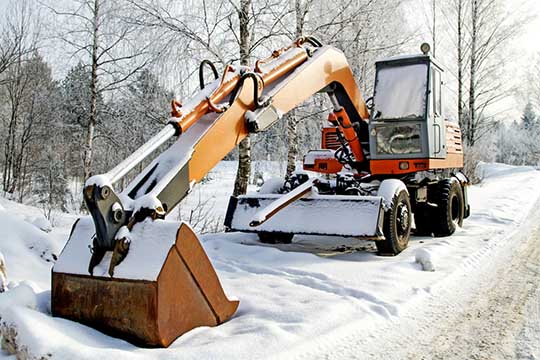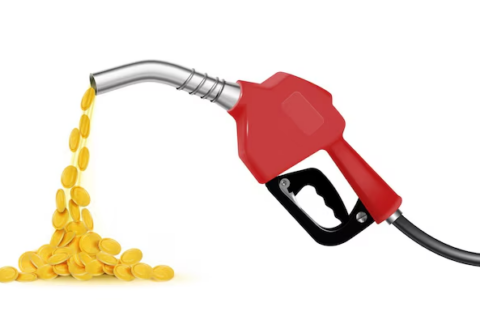Diesel Gelling and How to Prevent It

Anyone who uses diesel in vehicles or machinery knows the hassles colder weather brings in engine performance. And if you’ve been around diesel engines during the winter – you’ll sorely remember how temperamental they can be. Besides shoveling snow and scraping ice off the windshields, smart contractors, farmers, and fleet owners know to prepare for low temperatures – otherwise, they’ll be out in the cold with a motor or vehicle that won’t start. And nobody wants to begin their day with an engine that sputters and gives up. Whether you need to drive to your job, get your tractor moving, or start-up equipment – a motor that doesn’t fire can wreck your day. Read on to find out what the cause of poor winter engine performance is. And, best of all, what you can do about it.
Gelling & Engine Performance
Unlike gasoline, diesel fuel contains paraffin wax (also known as petroleum wax). This ingredient aims to increase lubrication and aid viscosity and does a great job in cool, mild, and warmer weather. But, as you can imagine – when it gets frigid, that wax starts to thicken up and become small crystals. That’s where the trouble begins.
Before the fuel enters the vehicle or machine engine, it goes through a filter to remove impurities. The filter is an integral part of helping keep your engine cleaner. But, in freezing temperatures, this filter can get clogged. Here’s what happens: as the temp drops, the wax-crystals stick to the fuel filter and prevent the engine from getting fuel. So, your engine doesn’t start. How cold does the weather have to be before it adversely affects performance? The short answer is cold enough to start turning the wax into crystals.
When the temperature drops to 32ºF, the liquid wax will begin turning to crystals. And at 10ºF to 15ºF, that wax will start gelling. That “gelling” is called cloud point and refers to fuel becoming cloudy because of the wax hardening. Fuel filters can get clogged up with these wax crystals, and the engine either doesn’t run or significantly drops in performance. That is called CFPP (cold filter plugging point). When the diesel becomes very solid – it’s called the “pour point” because it won’t pour or flow.
Gelling Terminology to Know
Just like with anything semi-technical, there are terms thrown around that are a good idea to know. Understanding these terms will help you when it comes time to select your winter fuel or purchase winterizing treatment. Here are the top three when it comes to gelling:
- Cold filter plugging point – called CFPP for short – Many people also refer to CFPP as “gelling.” In untreated diesel fuel, the CFPP is the point that wax crystals can form a gel and clog the fuel filter.
- Cloud point – is the temperature range that the wax starts to harden up into crystals and is generally around 32ºF to 40ºF.
- Pour point – references the lowest temp the fuel will still flow or pour.
When Cold Weather Hits – What to Watch Out For
If you have any of these signs – your fuel has gelled already:
- Sputtering engine
- An engine that’s hard to start
- Sluggish performance
- A significant change in fuel rail pressure
- Acceleration problems
Solutions For Gelling
Is there anything you can do if your diesel fuel starts gelling? The answer is yes. Using high-quality cold-weather diesel additives, you can prevent the diesel fuel from thickening in the first place.
Besides the anti-gelling qualities, a few other advantages of using anti-gelling additives are:
- Improvement in cold flow
- Reduction in cold filter plugging point
- Removal of harmful deposits
There are high-performing fuel treatments and additives that can prevent wax from turning to crystals in the first place. These additives can lower the pour and gel points, so the engine performs better at lower temperatures. That means when you come out in the morning, and it’s freezing – you can still get your rig, truck, tractor, construction generator, and equipment started.
Depending on your location, your fuel provider may have already added the treatment to the fuel. In other places that don’t experience such frigidly cold winters, you’d need to purchase the additive and pour it into your tank.
In the colder northern states, Ricochet purchases fuel from refiners that provide a unique winter formula that helps prevent gelling and lowers the cloud point to a minimum of 22 degrees. But in the southern states and Texas, refiners do not add this treatment to the fuel, so you would need to do that yourself. Remember, when winter comes around, in addition to any regular maintenance, it’s essential to know the lowest temperature your engines are operable.
For example, if your winters commonly hit the low 20s – make sure the fuel you’re using will keep your engines starting and running. Find out if there are already winterizing additives in your fuel or if you’ll need to add them yourself.
Go into any automotive supply store, and you’ll find several brands to choose from. Here are some of the better-known ones:
- Power Service Diesel Fuel Supplement
- Lucas Oil Anti-Gel Cold Weather Diesel Additive
- Diesel Power! Anti-Gel and Fuel Treatment
- FPPF Emergency Melt Down
- Diesel Winter Rescue
- Howes’ Diesel Treat’ Diesel Conditioner and Anti-Gel
The lower the temp, the more anti-gelling additive you should add to your fuel. Make sure you follow the directions on the bottle you purchase. There’s also a product called Winter’s Edge that can assist in melting frozen fuel filters and dispersing the water.
And no matter what, it’s a good idea to have some of this on hand and in your truck. We hope this information about gelling and keeping your diesel truck and equipment running smoothly during the winter has helped you. If you have any other questions about fuel efficiency, let us know – we’re happy to help.
Understanding the Impact of Cold Weather on Diesel Fuel Flow
Winter brings unique challenges for diesel fuel flow, primarily as temperatures drop and cause fuel to thicken. Restricted flow can appear in several ways:
- Reduced fuel pressure: In colder weather, diesel may struggle to maintain consistent pressure, impacting performance.
- Delayed response times: Engines may lag in response due to slower fuel movement through lines and injectors.
- Unexpected stalling or hesitations: When fuel flow slows down, engines may stall or hesitate, particularly under heavy loads.
The Role of Cold-Weather Maintenance for Diesel Performance
Routine maintenance becomes even more essential in winter. Checking your fuel system for residual deposits or moisture buildup can help you stay ahead of the season’s challenges. Engines under high strain (such as heavy-duty trucks or construction equipment) benefit from periodic fuel filter checks to catch clogs early.
Cold-Weather Fuel Grades & Regional Considerations
Depending on where you’re located, winter fuel formulations may vary. Northern states often use pre-treated winterized diesel, while those in warmer regions may need to add treatments themselves. Consider consulting with your fuel provider to confirm the grade of diesel delivered and its suitability for your location’s climate.
When to Contact Your Fuel Provider for Assistance
Sometimes, severe cold requires professional help. Diesel fuel suppliers like Ricochet Fuel offer tailored winter solutions, including diesel delivery with cold-weather treatments. A proactive consultation can ensure you’re ready for the season, avoiding costly downtime and keeping engines ready to go.
In Any Weather – You can Trust Ricochet Fuel
For over 30 years, Ricochet has been providing affordable and reliable bulk fueling. We offer various services in Texas, Arkansas, Louisiana, New Mexico, Oklahoma, Georgia, Iowa, Kansas, Mississippi, Missouri, Nebraska, Ohio, Pennsylvania, South Carolina, and Wisconsin.
We are here to help you save money and time. We can provide diesel fuel delivery directly into your vehicles, tanks, or equipment 24 hours every day, 7 days a week, 365 days a year, on a schedule that best fits your operation. We’re here to help you and your business in any weather. Contact us today at 833-724-2789.


